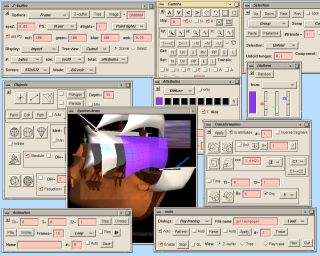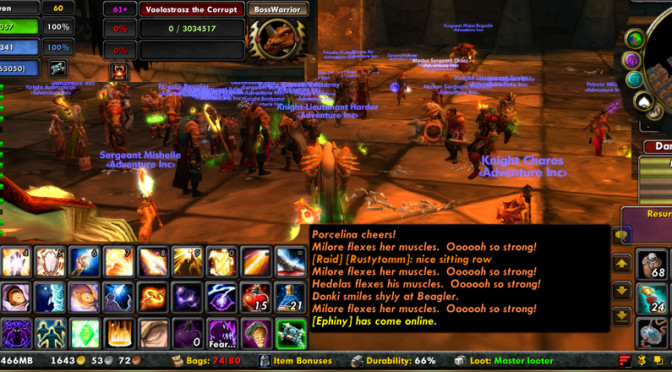In every game I’ve been involved with (and I’m sure most developers would agree), there’s a single teeny-tiny word that creates conflict more certainly than anything else: “More“. Developers want it. Gamers want it. Reviewers want it. Executives want it. Marketing people want it.
 Everybody wants their game, whether the one they’re making or the one they’re playing, to be jam-packed to the gills with stuff. Why? Well, features just make everything seem cooler. A gamer feels like they are getting better value for their dollar… and extra bullet points on the back of the box makes everyone happier.
Everybody wants their game, whether the one they’re making or the one they’re playing, to be jam-packed to the gills with stuff. Why? Well, features just make everything seem cooler. A gamer feels like they are getting better value for their dollar… and extra bullet points on the back of the box makes everyone happier.
But you’ve gotta ask yourself, is a game with 500 weapons really better than one with 10? Sure, if the game is about acquisition, like Diablo… However, a lot of action games generally aren’t better off with 20 different models of assault rifles (and there are plenty to go around… I used to play Phoenix Command, remember).
Is that extra stuff always worth it? Was No More Heroes really a better experience for having that empty open-world you could drive around in your motorcycle? Would Kane and Lynch have been better if you could get into those parked cars and driven around their dense one-block-sized levels?
 How about Spiderman 2? I’ve noticed this one to be a bit more divisive with developers, since it feeds into the almighty “gamer expectations”… Sure, he ran around an open-world like Grand Theft Auto, but should Spidey have been able to hop in a car and drive around New York City? Would it still have been a Spiderman game if instead of swinging through the rooftops, he was tooling around town in a low-rider?
How about Spiderman 2? I’ve noticed this one to be a bit more divisive with developers, since it feeds into the almighty “gamer expectations”… Sure, he ran around an open-world like Grand Theft Auto, but should Spidey have been able to hop in a car and drive around New York City? Would it still have been a Spiderman game if instead of swinging through the rooftops, he was tooling around town in a low-rider?
Game development is just as much about focus as it is about “doing neat stuffâ€. Your game is nothing if you don’t make a great core experience. Believe it or not, God of War really had a pretty simple combat system under the hood… they just polished the hell out of it. There weren’t 20 weapons, or an intricate collection of grapples and throws. There weren’t even that many enemies. They honed in on what their audience enjoyed and they were rewarded with a huge hit.
Bioshock started as a much more complicated game, reflecting its RPG roots in System Shock. There were a ton of cuts made to the game to make it more like a “shooterâ€. But dear lord, you sure can’t tell as a user of the end product… it’s still an incredibly complex game! I’m sure there were tons of fights inside the development team when the axe started falling.
 As I play GTA IV these days, for all its great gameplay and amazing accomplishment, it’s an iteration of a series that has been in development for over a decade. It’s got the biggest budget of all time. People are already starting to wonder what it’ll do to people’s expectations… Do they really think that Gran Turismo will suddenly allow you to get out of the car, enter the stands and buy a popcorn? That Soul Calibur will add rocket launchers and monster trucks? That Halo will allow you to hop in a frigate and become a free trader across the galaxy?
As I play GTA IV these days, for all its great gameplay and amazing accomplishment, it’s an iteration of a series that has been in development for over a decade. It’s got the biggest budget of all time. People are already starting to wonder what it’ll do to people’s expectations… Do they really think that Gran Turismo will suddenly allow you to get out of the car, enter the stands and buy a popcorn? That Soul Calibur will add rocket launchers and monster trucks? That Halo will allow you to hop in a frigate and become a free trader across the galaxy?
And more importantly, would those great experiences be better for it?
I’ve talked before about making sure that your game is scaled appropriately, but when and where do those cuts happen? I’ll hit this next time.
Sequel articles:Â More Part 2: Justifying the Axe, Pillars and Razors.
See also:Â Making the Rules: The Scale of a Game


Rich content is not the same as “complex”, and certainly not the same as having “500 guns”. I think you’re a tad confused on the difference between more content and rich content. I don’t really think that Bioshock and System Shock have anything to do with what you’re saying here. Bioshock wasn’t a dumbed down System Shock because it had less content, but because Bioshock’s content was presented in a much more straightforward manner so that the players had no need to think for themselves or use their imagination. Frankly, I felt like I was playing a game that had been catered for retards. While System Shock is a deep and stimulating experience, Bioshock’s depth is the equivalent of the shallow end of a child’s wading pool. While System Shock is a clever little piece of entertainment, Bioshock is an attempt to present that clever little piece of entertainment to an audience full of Forrest Gumps. Same thing with Morrowind and Oblivion. Oblivion doesn’t have less content then Morrowind, but its content was made “more accessible”, and thus, frustratingly stupid. It didn’t go from complex to simple, it went from rich to shallow. I am so very sad that every single frickin’ developer is doing that these days. Don’t underestimate your audience’s intelligence, PLEASE.
I most certainly am not afraid of “rich” content if it means “deep”, and I know that what I say freaks people into thinking I’m advocating simpler gamer to be more “accessible” (and nowhere did I say it was). While I think that burdensome presentation and overly complex interfaces go directly against reaching the audience you want to reach, what I generally avoid is complexity for complexity’s sake. There are times when I see a feature that seems like mental masturbation on the part of the designer, like gamers should pat them on the back.
I’ll get into this on the next post on this topic.
Samuel Dane:
“I am so very sad that every single frickin’ developer is doing that these days. Don’t underestimate your audience’s intelligence, PLEASE.”
I don’t know how to explain this to you, but it is not an underestimation.
Sorry. I wish it wasn’t true but the audience, en mass, is retarded, finding a non retarded audience is almost impossible and the numbers just don’t work. In theory the internets should allow niche audiences to open up, but mostly it just seems to enable ad supported content to hit the millions of retards it needs.
BTW what the audience wants is something that looks hideously complex, but is actually mostly down to dumb luck (or fake luck if you are talking single player). That way they can kid themselves that they are smart and persistence will triumph.
Personally I wish to create simple looking games that express more complexity as you play and understand them, rather than the other way around. Unfortunately this is a suicidal act.
“Perfection is achieved, not when there is nothing more to add, but when there is nothing left to take away.”
Antoine de Saint-Exupery
French writer (1900 – 1944)
http://www.quotationspage.com/quote/26979.html